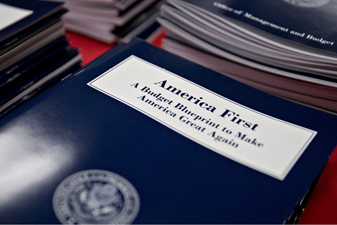|
By Katie Cross, Associate, Blakey & Agnew
New Presidents often release a budget blueprint shortly after taking office. Shorter than full budget requests and often much less specific, these blueprints are a President's first attempt at laying out their fiscal agenda and making basic projections. In mid-March, President Trump released his "skinny budget" proposal, titled "America First: A Budget Blueprint to Make America Great Again." In contrast to many past budget blueprints, President Trump's proposal was specific to discretionary government spending or spending that is determined by Congress in appropriations bills each year. Requests regarding mandatory spending, or spending that is required by law, were not included, leaving out about two thirds of total government expenditures.
While increasing funding for defense spending in fiscal year 2018 (FY18), the blueprint proposes cutting multiple federal agencies' discretionary funding dramatically, including a 16 percent cut to the Department of Commerce (DOC) and a 13 percent cut to the Department of Transportation (DOT).
Beyond cutting DOC's budget by 16 percent, the President's Blueprint would refocus the International Trade Administration (ITA) to enforcement and compliance, putting a greater emphasis on antidumping and countervailing duty investigations. It deemphasizes ITA's focus on promoting exports and completing trade analysis activities.
To achieve the 13 percent decrease at DOT, the proposal would, among other measures, eliminate the Transportation Investments Generating Economic Recovery (TIGER) grant program. President Trump again emphasized his wish to eliminate the TIGER program in a memo sent to Congressional appropriations committees on March 24 regarding fiscal year 2017 (FY17) appropriations. The federal government is currently operating under a continuing resolution (CR) which expires at the end of April. The administration's memo requests that Congress cut funding for the TIGER program in any appropriations bill for FY17.
To justify eliminating the TIGER grants, the administration argues that the Nationally Significant Freight and Highways Projects Program, referred to as FASTLANE grants by the Obama Administration and classified as mandatory spending, "supports larger highway and multimodal freight projects with demonstrable national or regional benefits." Industry stakeholders, including the Coalition for America's Gateways and Trade Corridors, have cautioned against this cut, saying the programs are not interchangeable – the Nationally Significant Freight and Highways Projects Program has freight-
|

focused investment criteria while the TIGER program addresses many mobility issues, including transit as well as freight. Secretary of Transportation Elaine Chao has said the proposal's savings are "largely geared towards future program investments" and that money is being moved out of inefficient programs to be freed up for a future infrastructure package.
It is likely this budget proposal will see many changes during the FY18 appropriations process when Congress includes its own priorities. Still, the Budget Blueprint isn't the only way the Trump Administration is attempting to refocus the federal government. Shortly after his inauguration, President Trump signed an executive order mandating that for every new regulation, two existing regulations be repealed. Meant to combat what President Trump has said is overregulation that hampers American economic growth, the executive order is an attempt to control costs for the federal government but excludes regulations that are related to the nation's security.
President Trump also ordered each federal agency to establish a Regulatory Reform Task Force. Each Task Force will examine existing regulations and identify those that are unnecessary, outdated, duplicative or otherwise burdensome and develop recommendations as to how to deal with them. In March, President Trump signed another executive order requiring each federal agency to evaluate where money can be saved and how the agency can best be reorganized. The executive order is meant to eliminate redundancies and "make the federal government work better."
It's still unclear how these various streamlining orders will impact each federal agency or the cargo industry in the United States. The Office of Management and Budget is expected to release the full FY18 budget request in May and, if rumors are to be believed, an infrastructure package should be taken up by Congress either with or shortly after a tax package is addressed.
Blakey & Agnew, LLC is a public affairs and
communications consulting firm based in
Washington, DC.
|




